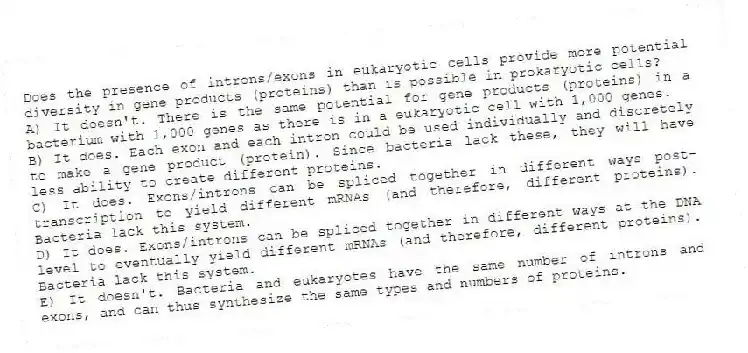
Does the presence of introns/exons in eukaryotic cells provide more potential diversity in gene products (proteins) than is possible in prokaryotic cells?
A) It doesn't. There is the same potential for gene products (proteins) in a bacterium with 1,000 genes as there is in a eukaryotic cell with 1,000 genes.
B) It does. Each exon and each intron could be used individually and discretely to make a gene product (protein) . Since bacteria lack these, they will have less ability to create different proteins.
C) It does. Exons/introns can be spliced together in different ways post-transcription to yield different mRNAs (and therefore, different proteins) . Bacteria lack this system.
D) It does. Exons/introns can be spliced together in different ways at the DNA level to eventually yield different mRNAs (and therefore, different proteins) . Bacteria lack this system.
E) It doesn't. Bacteria and eukaryotes have the same number of introns and exons, and can thus synthesize the same types and numbers of proteins.
Correct Answer:
Verified
Q75: The simultaneous regulation of many bacterial genes
Q76: If a DNA triplet is AGT, the
Q77: When E. coli is grown in medium
Q78: Which tasks must a bacterial cell accomplish
Q79: Cells are often ground up with abrasive
Q81: Your niece has been diagnosed with Diamond-Blackfan
Q82: Your niece has been diagnosed with Diamond-Blackfan
Q83: Your patient has a fever of 39oC,
Q84: Your patient has a fever of 39oC,
Q85: When E. coli is placed in a
Unlock this Answer For Free Now!
View this answer and more for free by performing one of the following actions

Scan the QR code to install the App and get 2 free unlocks

Unlock quizzes for free by uploading documents